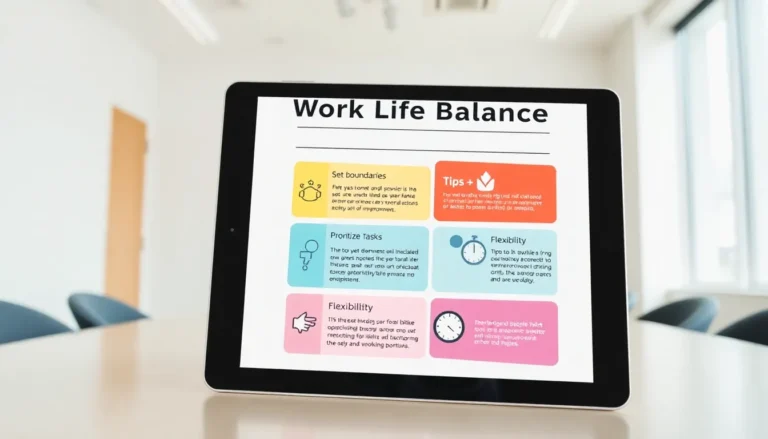Table of Contents
ToggleLet’s face it: talking about mental health can feel as awkward as trying to parallel park for the first time. Yet, just like that elusive parking spot, it’s crucial to navigate successfully. Mental health isn’t just important: it’s essential. In our fast-paced world, recognizing the significance of maintaining mental well-being is key to living a fulfilling life. So, buckle up and get ready for a journey that dives deep into why your mental health matters, and how to take care of it without losing your sanity.
Understanding Mental Health

Mental health refers to cognitive, emotional, and social well-being. It impacts how individuals think, feel, and act, shaping their interactions with the world around them. Contrary to popular belief, mental health doesn’t solely pertain to mental disorders. Everyone possesses mental health, much like physical health. Hence, maintaining it is paramount. Common factors affecting mental health include genetics, brain chemistry, trauma, and life experiences. Understanding these components is the first step toward acknowledging the importance of prioritizing mental well-being.
The Importance of Mental Health
Mental health is foundational to overall wellness. Imagine trying to function as a vibrant, productive individual while carrying the weight of poor mental health. Not fun, right? Just as physical health is crucial for performance, so is mental health. Healthy mental states contribute to improved relationships, increased productivity, and better physical health. They lead to a more balanced life, allowing individuals to enjoy regular activities without undue stress or anxiety. Investors have even recognized the financial value: studies show that companies fostering mental well-being see significant boosts in employee engagement, loyalty, and productivity.
Common Mental Health Challenges
Recognizing the spectrum of mental health challenges is essential for effective support. From anxiety and depression to more complex disorders, the landscape is vast.
Recognizing Signs of Distress
Mental health issues aren’t always easy to spot. Often, they manifest through changes in mood, behavior, and energy levels. Paying attention to these subtle signals can make all the difference. For instance, if someone who typically enjoys socializing begins isolating themselves, this could indicate distress. Similarly, persistent fatigue, irritability, and difficulty concentrating can often hint at underlying concerns.
Impact of Mental Health on Daily Life
When mental health struggles go unaddressed, they ripple through everyday life. They can impede personal relationships and affect job performance. Imagine someone awake at 2 AM, battling racing thoughts, unable to catch a break. This constant mental noise can even impact physical health, leading to tension headaches or stomach issues. Understanding this connection is vital: it reminds everyone that mental well-being is an integral part of overall health.
Coping Strategies for Mental Well-Being
Knowing how to cope with stress is incredibly beneficial for mental health. First, it’s important to find what works best for each individual, as coping strategies can vary widely.
Consider various techniques such as mindfulness, where one focuses on the present moment, or physical activities that produce endorphins, nature’s natural mood lifters. Engaging in hobbies or creative outlets also provides a fantastic path for self-expression. Also, maintaining a routine can add structure, making life feel more manageable. It’s a simple yet effective way to regain control amid chaos.
Seeking Professional Help
Sometimes, self-help strategies aren’t enough. In such cases, seeking professional help is a vital step. Psychologists, psychiatrists, and counselors can offer tailored support that addresses specific challenges. They provide a safe space to explore feelings, thoughts, and behaviors without judgment. Also, modern therapy has advanced beyond traditional talking: it may include techniques like cognitive-behavioral therapy (CBT) or even art and music therapy. Don’t shy away from reaching out. It’s an act of strength, not weakness.
Creating a Supportive Environment
The environment significantly influences mental health. Individuals should surround themselves with supportive people who uplift and encourage them. Friends and family play a crucial role here, but so do the additional circles in one’s life, including workplaces and communities. Creating an atmosphere where open discussions about mental health are allowed can foster connection and understanding. Simple things, like checking in regularly on loved ones, can lead to meaningful conversations and, eventually, healthier relationships.







